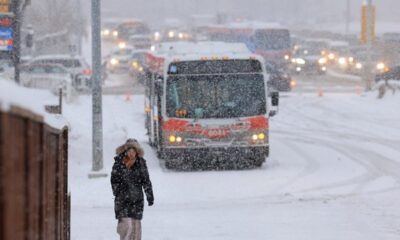Health
Alberta Faces Influenza Surge as Hospitals Brace for Impact

Influenza cases are rising sharply in Alberta, leading to increased hospitalizations as healthcare professionals prepare for a challenging winter season. The province’s flu positivity rate surged to 11.5 percent during the second week of November, a significant jump from 3.4 percent just two weeks prior. According to Dr. Lynora Saxinger, an infectious diseases specialist at the University of Alberta Hospital, “It’s a pretty solid upswing. The season has started.”
So far this season, influenza has caused 251 hospitalizations, with 158 cases reported in the Calgary zone alone. Additionally, seventeen Albertans have been admitted to intensive care units (ICUs) and six fatalities have been recorded. As of November 15, data indicated that 74 individuals were hospitalized due to influenza, marking a nearly three-fold increase within two weeks.
Increased Demand on Healthcare Facilities
The emergency department at the Alberta Children’s Hospital is also experiencing heightened demand. Dr. Stephen Freedman, a professor of pediatrics and emergency medicine at the University of Calgary, noted a marked increase in cases following a brief lull during a recent teachers’ strike. He stated, “Most of the children who seem to be sickest right now have either influenza or RSV.”
Alberta’s current flu surge is predominantly driven by two strains of influenza A: H3N2 and H1N1. Notably, H3N2, which has the potential to cause more severe illness, accounts for over half of the confirmed cases this season. This uptick in cases coincides with concerning international influenza trends, as highlighted by Angela Rasmussen, a virologist at the University of Saskatchewan. She remarked that countries like Japan and the United Kingdom are experiencing early and severe flu seasons.
Complicating the situation is the emergence of a new H3N2 variant known as subclade K, which appeared after the formulation of this season’s North American flu vaccines. Rasmussen expressed concern that this variant might not align well with the vaccine, stating, “It looks like this variant is kind of gaining momentum.”
Vaccination Remains Crucial
Despite uncertainties about vaccine effectiveness against the newly identified variant, health experts continue to advocate for vaccination. “The real benefit of the flu shot is that if you do get infected, it keeps you from getting really, really sick,” Rasmussen emphasized. Freedman echoed this sentiment, pointing out that vaccination has shown to be particularly effective in children, with data from the UK indicating a 70 to 75 percent effectiveness rate in reducing emergency department visits among pediatric patients.
Alberta’s Primary and Preventative Health Services reported that current hospitalization and positivity rates are comparable to those of previous years. An official statement noted that it is still too early to ascertain the full impact of this flu season. Saxinger highlighted the unpredictability of influenza patterns, particularly with both H3N2 and H1N1 strains circulating simultaneously. “It’s unusual to see both strains at the same time, and we always worry with an H3N2 season that you might see more severe disease in older people,” she said.
The rise in flu cases follows a trend of declining immunization rates in Alberta, contributing to fears of a more severe flu season than the previous year, which was marked by a record number of flu-related deaths. Rasmussen warned, “One of my biggest concerns is that this year we’re going to outdo that potentially.”
In addition to the flu, health officials are also monitoring the rise of avian influenza outbreaks across Canada and the United States. The interplay between human seasonal flu and avian flu raises the risk of dual infections, which could lead to the mixing of viruses and the emergence of new strains. Rasmussen cautioned, “Our continent is essentially full of bird flu, and now there’s going to be a lot of human seasonal flu in the mix as well. It means that the risk is elevated.”
As Alberta navigates this influenza surge, health professionals continue to stress the importance of vaccination as the best defense against severe illness and hospitalizations.
-

 Politics3 weeks ago
Politics3 weeks agoSecwepemc First Nation Seeks Aboriginal Title Over Kamloops Area
-

 World4 months ago
World4 months agoScientists Unearth Ancient Antarctic Ice to Unlock Climate Secrets
-

 Entertainment5 months ago
Entertainment5 months agoTrump and McCormick to Announce $70 Billion Energy Investments
-

 Lifestyle4 months ago
Lifestyle4 months agoTransLink Launches Food Truck Program to Boost Revenue in Vancouver
-

 Science5 months ago
Science5 months agoFour Astronauts Return to Earth After International Space Station Mission
-

 Technology3 months ago
Technology3 months agoApple Notes Enhances Functionality with Markdown Support in macOS 26
-

 Top Stories2 months ago
Top Stories2 months agoUrgent Update: Fatal Crash on Highway 99 Claims Life of Pitt Meadows Man
-

 Lifestyle3 months ago
Lifestyle3 months agoManitoba’s Burger Champion Shines Again Amid Dining Innovations
-

 Sports5 months ago
Sports5 months agoSearch Underway for Missing Hunter Amid Hokkaido Bear Emergency
-

 Politics4 months ago
Politics4 months agoUkrainian Tennis Star Elina Svitolina Faces Death Threats Online
-

 Politics4 months ago
Politics4 months agoCarney Engages First Nations Leaders at Development Law Summit
-

 Technology5 months ago
Technology5 months agoFrosthaven Launches Early Access on July 31, 2025



















